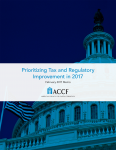Principles for Tax Reform and Regulatory Improvement

As our national leaders move forward with plans to revitalize the U.S. economy, no two issues have more promise to unleash America’s potential than comprehensive tax reform and improvements to the federal regulatory process. On tax reform, our tax code is significantly dated. Taxes, especially on the business side, are too high and unnecessarily complicated. The cumbersome tax system stifles economic growth and restricts our ability to create jobs. That is why the American Council for Capital Formation has developed a broad set of policy recommendations to streamline the tax code to make it simpler, fairer, and more oriented toward the formation of capital. President Trump and the leaders of the 115th Congress have both expressed a commitment to making tax reform a reality, using the momentum of the November elections to galvanize bipartisan support for pro-growth tax policies. The president during his inaugural address restated his support for ensuring that tax policy works to the benefit of American businesses and families. Speaker Paul Ryan and House Ways and Means Committee Chairman Kevin Brady have laid out their own blueprint for reforming the tax code. President Trump’s call for action mirrors many of the features of the House GOP blueprint.…








